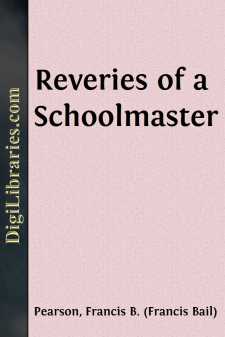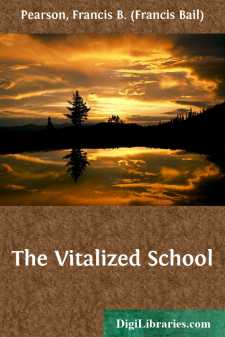Categories
- Antiques & Collectibles 13
- Architecture 36
- Art 48
- Bibles 22
- Biography & Autobiography 813
- Body, Mind & Spirit 141
- Business & Economics 28
- Children's Books 12
- Children's Fiction 9
- Computers 4
- Cooking 94
- Crafts & Hobbies 4
- Drama 346
- Education 46
- Family & Relationships 57
- Fiction 11826
- Games 19
- Gardening 17
- Health & Fitness 34
- History 1377
- House & Home 1
- Humor 147
- Juvenile Fiction 1873
- Juvenile Nonfiction 202
- Language Arts & Disciplines 88
- Law 16
- Literary Collections 686
- Literary Criticism 179
- Mathematics 13
- Medical 41
- Music 40
- Nature 179
- Non-Classifiable 1768
- Performing Arts 7
- Periodicals 1453
- Philosophy 64
- Photography 2
- Poetry 896
- Political Science 203
- Psychology 42
- Reference 154
- Religion 513
- Science 126
- Self-Help 83
- Social Science 81
- Sports & Recreation 34
- Study Aids 3
- Technology & Engineering 59
- Transportation 23
- Travel 463
- True Crime 29
Reveries of a Schoolmaster
Categories:
Description:
Excerpt
CHAPTER I
IN MEDIAS RES
I am rather glad now that I took a little dip (one could scarce call it a baptism) into the Latin, and especially into Horace, for that good soul gave me the expression in medias res. That is a forceful expression, right to the heart of things, and applies equally well to the writing of a composition or the eating of a watermelon. Those who have crossed the Channel, from Folkstone to Boulogne, know that the stanch little ship Invicta had scarcely left dock when they were in medias res. They were conscious of it, too, if indeed they were conscious of anything not strictly personal to themselves. This expression admits us at once to the light and warmth (if such there be) of the inner temple nor keeps us shivering out in the vestibule.
Writers of biography are wont to keep us waiting too long for happenings that are really worth our while. They tell us that some one was born at such a time, as if that were really important. Why, anybody can be born, but it requires some years to determine whether his being born was a matter of importance either to himself or to others. When I write my biographical sketch of William Shakespeare I shall say that in a certain year he wrote "Hamlet," which fact clearly justified his being born so many years earlier.
The good old lady said of her pastor: "He enters the pulpit, takes his text, and then the dear man just goes everywhere preaching the Gospel." That man had a special aptitude for the in medias res method of procedure. Many children in school who are not versed in Latin would be glad to have their teachers endowed with this aptitude. They are impatient of preliminaries, both in the school and at the dinner-table. And it is pretty difficult to discover just where childhood leaves off in this respect.
So I am grateful to Horace for the expression. Having started right in the midst of things, one can never get off the subject, and that is a great comfort. Sometimes college graduates confess (or perhaps boast) that they have forgotten their Latin. I fear to follow their example lest my neighbor, who often drops in for a friendly chat, might get to wondering whether I have not also forgotten much of the English I am supposed to have acquired in college. He might regard my English as quite as feeble when compared with Shakespeare or Milton as my Latin when compared with Cicero or Virgil. So I take counsel with prudence and keep silent on the subject of Latin.
When I am taking a stroll in the woods, as I delight to do in the autumn-time, laundering my soul with the gorgeous colors, the music of the rustling leaves, the majestic silences, and the sounds that are less and more than sounds, I often wonder, when I take one bypath, what experiences I might have had if I had taken the other. I'll never know, of course, but I keep on wondering. So it is with this Latin. I wonder how much worse matters could or would have been if I had never studied it at all. As the old man said to the young fellow who consulted him as to getting married: "You'll be sorry if you do, and sorry if you don't." I used to feel a sort of pity for my pupils to think how they would have had no education at all if they had not had me as their teacher; now I am beginning to wonder how much further along they might have been if they had had some other teacher....




